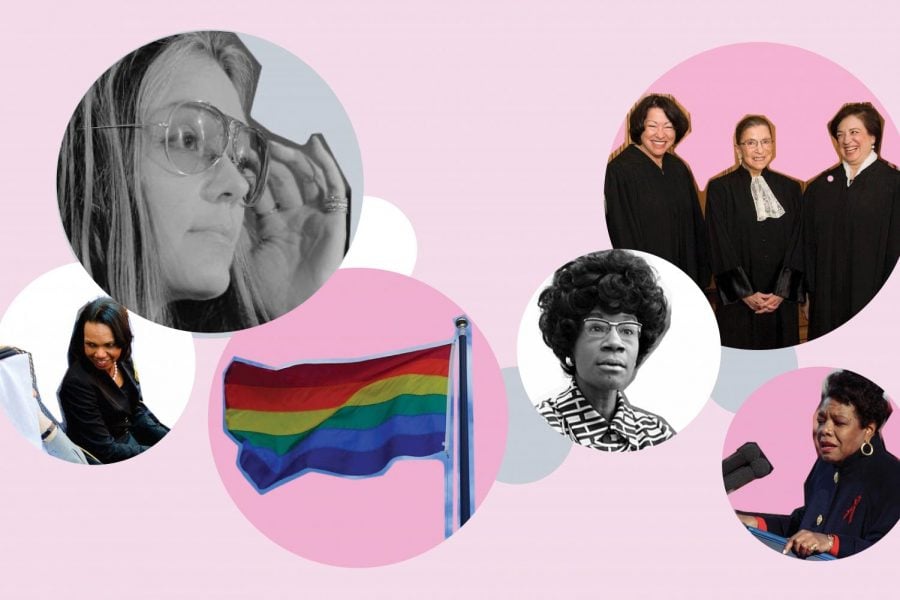Gender and Sexuality Studies Program celebrates 45th anniversary
Northwestern’s Gender and Sexuality Studies Program was founded in 1975, making this its 45th year.
October 4, 2020
This year marks the 45th anniversary of the Gender and Sexuality Studies Program at Northwestern. Founded in 1975 as the Women’s Studies Program, the program has broadened its scope to be more inclusive, changing its name to the Gender Studies Program in 2000 and then the GSS Program in 2012.
Anthropology Prof. Mary Weismantel was the director of the program during its most recent name change, and she said she was the person who “pushed (the change) through.”
“We already had people who are teaching sexuality studies,” Weismantel said. “Sexuality studies is a related but distinct field of study from gender studies, so it’s important to recognize that.”
Weismantel added that the program also changed its curriculum so undergraduate and graduate students would be required to take at least one course in gender studies and one course in sexuality studies.
The name change was also in part a response to the creation of the Sexualities Project at Northwestern, which helps fund collaborative and interdisciplinary research on sexuality. SPAN was founded 10 years ago by sociology Prof. Héctor Carrillo and humanities and sociology Prof. Steven Epstein. Carrillo currently co-directs the program alongside linguistics Prof. Gregory Ward.
“This all coincides with the time when it became clear that it’s very hard to separate gender studies from sexuality studies,” Carrillo said. “There’s so much overlap between gender diversity and sexual diversity that we needed to have a focus as a program but also within SPAN that allowed us to explore cutting-edge topics.”
Carrillo added that as time passes, the notion of diversity also changes and expands. So, as a result, the GSS Program has changed to foster greater diversity and inclusion.
Communication Prof. Janice Radway, the current director of the GSS Program, said the name change reflects how the field has been “dynamic and responsive,” changing in response to the activism of younger women, undergraduate students and graduate students.
She said NU’s GSS Program is unique because of the “sort of equal and happy emphasis” on both gender and sexuality and equal interest in both gender and sexuality studies.
We are beginning to have as many courses focusing on trans and non-binary issues as we have on, for instance, feminist history and on feminism,” Radway said. “We have a large interdisciplinary faculty that we draw from across the campus.”
In response to the protests and activism surrounding Black Lives Matter and anti-Black racism, Radway said the program is discussing what they can do to make the courses more intersectional and to put Black feminist thought in the foreground.
“We have tried to think creatively about how we can continue to foreground questions about anti-Blackness, about racism, about policing and governmentality and the way it operates unequally and unfairly across different populations,” Radway said.
For Weinberg junior Sarah Eisenman, the program is one of the few places on campus where she felt she could critically engage in gender and sexuality studies — something she had been passionate about but never studied in an academic context.
The program’s niche classes, like one Eisenman took on gender-affirmation surgeries in Thailand, constantly change her perspective on gender and sexuality through an academic lens. That class in particular, she said, was interesting because it was one of the first chances she got to explore gender and sexuality studies in a non-Western context.
“There’s a big effort being made on the part of students as well as faculty to make sure we’re covering these gaps and taking into account the voices that haven’t been heard and historically ignored in the discipline itself,” Eisenman said.
Isabelle Sarraf contributed reporting.
Email: vivianxia2023@u.northwestern.edu
Twitter: @vivianxia7
Related Stories:
— STITCH panel discusses intersection of fashion, gender and sexuality
— Sexualities Project at Northwestern reflects on progress made in 10 years since founding
— 50 Years of Queer Anger: Everyone should take a gender and sexuality course



